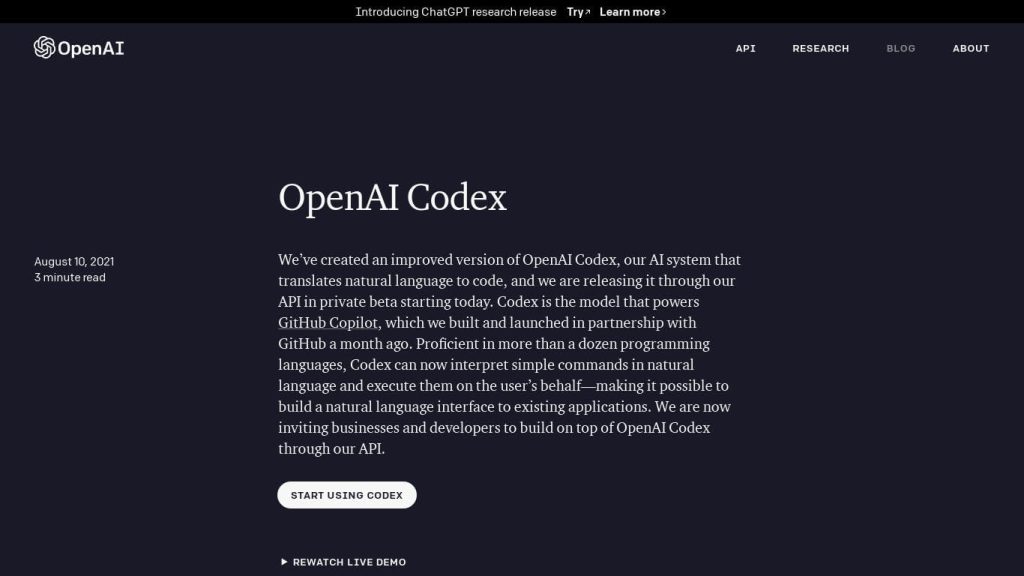What is OpenAI Codex?
Codex by OpenAI is the newest development at OpenAI that understands and transposes natural language into code. This powerful AI system has just been launched, along with a private beta API that will make it available to businesses and developers looking to build more intuitive natural language interfaces for their applications.
On the power of the predecessor, GPT-3, OpenAI Codex handles a wide breadth of programming tasks, hence being an extremely useful tool for expert developers and those just starting their development journey.
OpenAI Codex’s Key Features & Benefits
-
Improved AI system:
OpenAI Codex represents a sophisticated AI rewriting natural language into code. -
Multi-programming language support:
It understands a wide variety of languages such as Python, JavaScript, Go, Perl, PHP, Ruby, Swift, TypeScript, and Shell. -
Larger Contextual Memory:
Having 14KB memory for Python code makes it an easier way to deal with any complex contextual information with ease for Codex. -
Versatile Functionality:
It can handle a wide range of tasks like transpilation, code explanation, and refactoring. -
API accessibility:
Available in private beta, it allows developers and businesses to embed Codex into their projects.
It enhances productivity by making the process of coding easier and reduces barriers to entry in programming, letting non-coders interact with software with far greater ease.
OpenAI Codex Use Cases and Applications
They range from a very wide range of scenarios where OpenAI Codex can be used, including:
-
Transpilation:
This involves the conversion of code from one programming language to another. -
Code Explanation:
It explains in detail any complicated code segment. -
Refactoring:
It improves the structure of existing code without changing its functionality.
It means industries, from software houses and educational sectors to non-technical areas, may get value from Codex. For instance, teachers can utilize it to teach programming to students more easily, while companies can implement it in their software to provide more intuitive user interfaces.
How to Use OpenAI Codex
Just follow the below steps to get started with OpenAI Codex.
-
Sign Up:
Apply for access to the private beta via the OpenAI API. -
Integration:
In case of a successful application, an API would be provided to integrate Codex into the development environment. -
Usage:
Start using natural language commands for generating, explaining, or refactoring code.
For best results, be sure that your natural language prompts are clear and specific. Explore the user interface; all the different functionalities Codex has to offer.
How OpenAI Codex Works
Under the hood, OpenAI Codex makes use of sophisticated machine learning algorithms in understanding and translating natural language into code. It is an extension of GPT-3 architecture but augments it manifold, especially for programming tasks.
On a high level, this is what the system does: It runs natural language input in a huge neural network to generate code. In Python, with 14KB memory, it can organize complex tasks through a richly held context.
Now, as with any other tool, there are associated pros and cons of OpenAI Codex. The platform simplifies complex programming tasks. Furthermore, it is designed to support multiple languages in coding. Additionally, the large memory makes handling contextual information easy. It makes it easy for non-programmers to code. The downside is that this product is currently only available in private beta. This may need fine-tuning in some cases, especially in specific scenarios. Most of the users are responding positively, noting its efficiency and ease of use although others have added that the product still needs further refinements.
Conclusion on OpenAI Codex
It is, therefore, the case that OpenAI Codex is such a revolutionary tool bridging the gap between natural language and code. The range of functionalities, plus the ability to support many programming languages, makes it very resourceful for both developers and businesses. Though presently in private beta, potential applications and benefits are already obvious, hence portraying a very bright future for this AI system.
It is bound to become even more indispensable with more features, broader accessibility, and further refinements in the near future.
OpenAI Codex FAQs
-
What is OpenAI Codex?
OpenAI Codex is an AI-powered system that can translate natural language into code and support a host of programming tasks. -
Which programming languages does OpenAI Codex support?
More than twelve, including Python, JavaScript, Go, Perl, PHP, Ruby, Swift, TypeScript, Shell. -
How large is OpenAI Codex’s memory for Python code?
OpenAI Codex uses a 14KB memory for Python code, capable of storing complex contextual information. -
How do I get access to OpenAI Codex?
It is in private beta. Developers must sign up to gain access to Codex via the OpenAI API. -
What are the advantages of using OpenAI Codex?
It eases a number of programming tasks, like transpilation and explanation of code in general, and refactoring, hence making coding easier for non-programmers.










